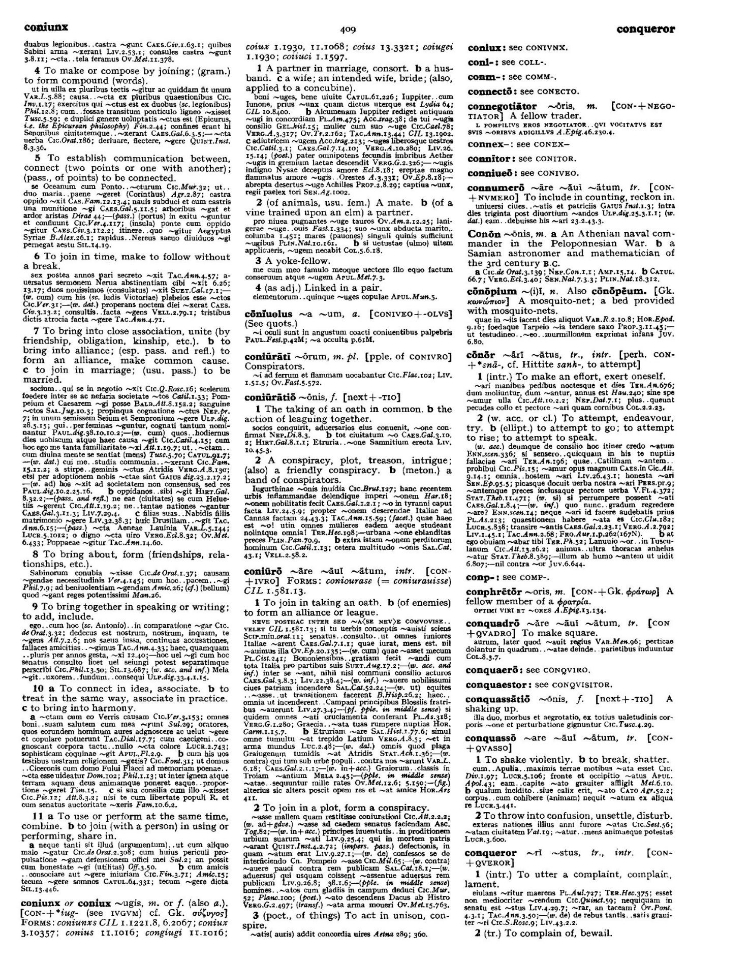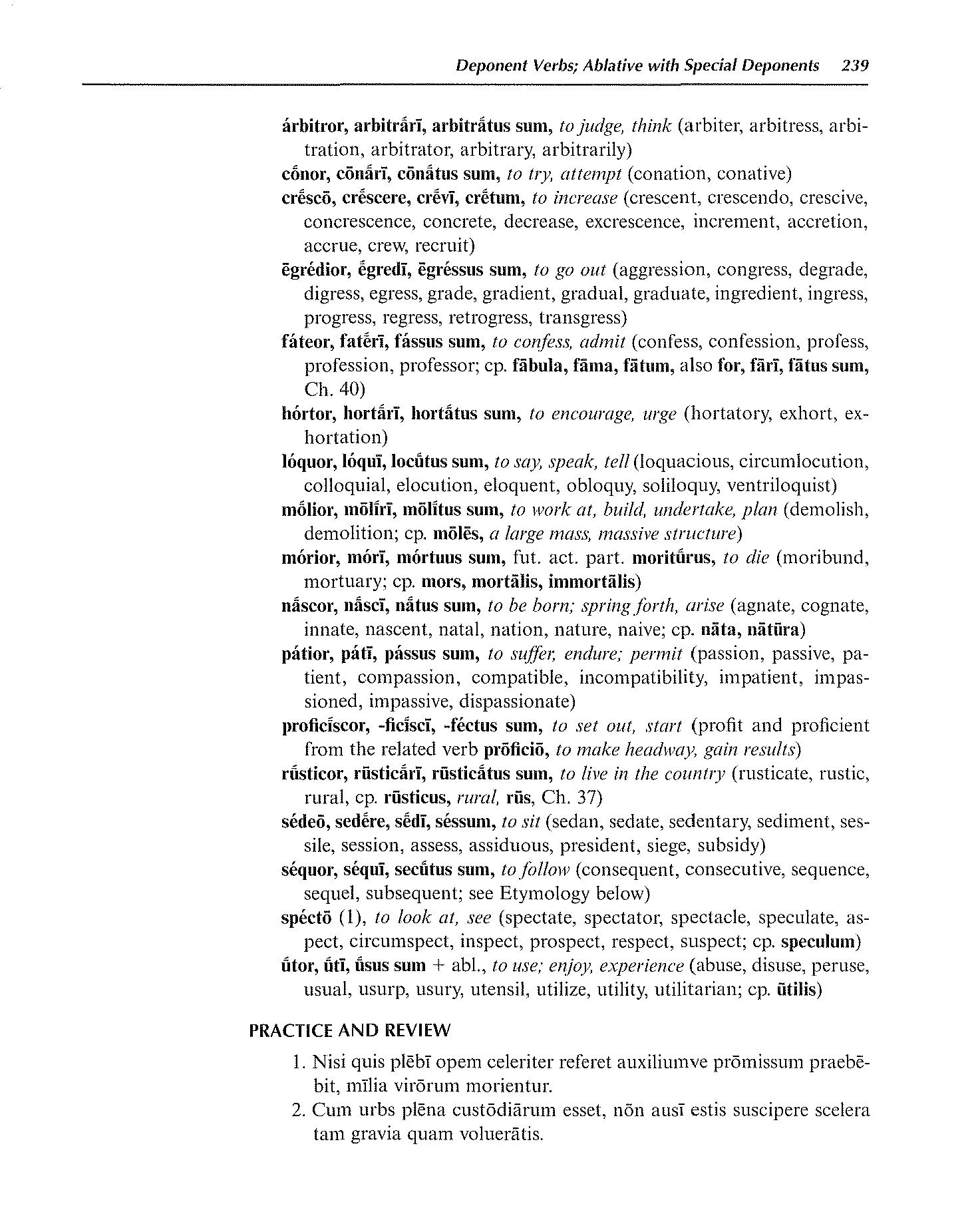
page_listing.tpl
page_subListingDetails.tpl
sub_listingDetails_style1.tpl
sub_listingDetails.title.tpl
cōnārī to try
cōnārī is a Latin Verb that primarily means to try.
Definitions for cōnārī
Wheelock's Latin
Verb
- 1
to try, attempt
English derivatives:
conation conative
Oxford Latin Dictionary
Verb
- 1
(intr.) To make an effort, exert oneself.
- 2
(w. acc. or cl.) To attempt, endeavour, try. (b) (ellipt.) to attempt to go; to attempt to rise; to attempt to speak.
Sentences with cōnārī
Latin to English
Cōnābimur haec mala patī.Compare We shall try to endure these evils.
Cum in aliam terram proficīscī cōnārētur, ā mīlitibus captus est.Compare When he tried to set out into another land, he was captured by soldiers.
Cōnāmur ducī persuādēre nē artibus et lēgibus patriae noceat.Compare We are trying to persuade the leader not to harm the arts and laws of the country.
Si puto possum tu ille regnum potior, conor.Compare If you think that you can gain possession of that kingdom, make the attempt.
Reperio T. Ampius conor tollo pecunia Ephesus ex fanum Diana.Compare He found that T. Ampius had attempted to take the money from the temple of Diana at Ephesus.
Conjugation table for cōnārī
Cactus2000
| ACTIVE | |
| Indicative present | Indicative imperfect |
| cōnor cōnāris cōnātur cōnāmur cōnāminī cōnantur | cōnābar cōnābāris cōnābātur cōnābāmur cōnābāminī cōnābantur |
| Indicative perfect | Indicative pluperfect |
| cōnātus sum cōnātus es cōnātus est cōnātī sumus cōnātī estis cōnātī sunt | cōnātus eram cōnātus erās cōnātus erat cōnātī erāmus cōnātī erātis cōnātī erant |
| Indicative future | Indicative future perfect |
| cōnābor cōnāberis cōnābitur cōnābimur cōnābiminī cōnābuntur | cōnātus erō cōnātus eris cōnātus erit cōnātī erimus cōnātī eritis cōnātī erunt |
| Subjunctive present | Subjunctive imperfect |
| cōner cōnēris cōnētur cōnēmur cōnēminī cōnentur | cōnārer cōnārēris cōnārētur cōnārēmur cōnārēminī cōnārentur |
| Subjunctive perfect | Subjunctive pluperfect |
| cōnātus sim cōnātus sīs cōnātus sit cōnātī sīmus cōnātī sītis cōnātī sint | cōnātus essem cōnātus essēs cōnātus esset cōnātī essēmus cōnātī essētis cōnātī essent |
Infinitive present cōnārī Infinitive perfect cōnātum esse Infinitive future cōnātūrum esse | Imperative present cōnāre cōnāminī Imperative future cōnāto / cōnātor cōnāto / cōnātor - cōnanto / cōnantor |
| PARTICIPLE | ||
| Participle present active | ||
| cōnāns | cōnantēs | |
| cōnāns | cōnantēs | |
| cōnāns | cōnantēs | |
| cōnāns | cōnantēs | |
| cōnāns | cōnantēs | |
| Participle future active | ||
| cōnātūrus | cōnātūrī | |
| cōnātūrus | cōnātūrī | |
| cōnātūrus | cōnātūrī | |
| cōnātūrus | cōnātūrī | |
| cōnātūrus | cōnātūrī | |
| Participle perfect passive | ||
| cōnātus | cōnātī | |
| cōnātus | cōnātī | |
| cōnātus | cōnātī | |
| cōnātus | cōnātī | |
| cōnātus | cōnātī | |
| Gerundive | ||
| cōnandus | cōnandī | |
| cōnandus | cōnandī | |
| cōnandus | cōnandī | |
| cōnandus | cōnandī | |
| cōnandus | cōnandī | |
| Gerund | Supine | |
| cōnārī | cōnātum | |
| cōnārī | cōnātū | |
| cōnārī | ||
| cōnārī | ||
| cōnārī | ||
| PARTICIPLE | ||
| Participle present active | ||
| Nom. | cōnāns | cōnantēs |
| Gen. | cōnantis | cōnantium |
| Dat. | cōnantī | cōnantibus |
| Acc. | cōnantem | cōnantēs |
| Abl. | cōnante | cōnantibus |
| Participle future active | ||
| Nom. | cōnātūrus | cōnātūrī |
| Gen. | cōnātūrī | cōnātūrōrum |
| Dat. | cōnātūrō | cōnātūrīs |
| Acc. | cōnātūrum | cōnātūrōs |
| Abl. | cōnātūrō | cōnātūrīs |
| Participle perfect passive | ||
| Nom. | cōnātus | cōnātī |
| Gen. | cōnātī | cōnātōrum |
| Dat. | cōnātō | cōnātīs |
| Acc. | cōnātum | cōnātōs |
| Abl. | cōnātō | cōnātīs |
| Gerundive | ||
| Nom. | cōnandus | cōnandī |
| Gen. | cōnandī | cōnandōrum |
| Dat. | cōnandō | cōnandīs |
| Acc. | cōnandum | cōnandōs |
| Abl. | cōnandō | cōnandīs |
| Gerund | Supine | |
| Nom. | cōnārī | cōnātum |
| Gen. | cōnandī | cōnātū |
| Dat. | cōnandō | |
| Acc. | cōnandum | |
| Abl. | cōnandō | |
Data sources
Notes
- Definitions
- Frederick M. Wheelock, Wheelock's Latin, 6th ed., rev. Richard A. LaFleur (New York, NY: HarperCollins Publishers, 2005): 239.
- P. G. W. Glare, Oxford Latin Dictionary, Vols. 1-8 (Oxford: Clarendon Press, 1982): 409.
- Word frequencies
- Christopher Francese, "Latin Core Vocabulary," Dickinson College Commentaries, last modified 2014, http://dcc.dickinson.edu.
- Paul B. Diederich, The Frequency of Latin Words and Their Endings, PhD diss., (Columbia University, 1939).
- Louis Delatte, Suzanne Govaerts, Joseph Denooz, and Etienne Evrard, Dictionnaire fréquentiel et index inverse de la langue latine [Frequency Dictionary and Inverse Index of the Latin Language] (Liège, Belgium: Laboratoire d'analyse statistique des langues anciennes de l'Université de Liège [L.A.S.L.A.], 1981): 119-219.
Bibliography
Allen, Joseph H. Allen and Greenough's New Latin Grammar for Schools and Colleges: Founded on Comparative Grammar. Edited by James B. Greenough, George L. Kittredge, Albert A. Howard, and Benjamin L. D'Ooge. Boston, MA: Ginn & Company, 1903.
Crystal, David. A Dictionary of Linguistics and Phonetics. 6th ed. Oxford, UK: Blackwell Publishing, 2008.
Delatte, Louis, Suzanne Govaerts, Joseph Denooz, and Etienne Evrard. Dictionnaire fréquentiel et index inverse de la langue latine [Frequency Dictionary and Inverse Index of the Latin Language]. Liège, Belgium: Laboratoire d'analyse statistique des langues anciennes de l'Université de Liège (L.A.S.L.A.), 1981.
Diederich, Paul B. The Frequency of Latin Words and Their Endings. PhD diss., Columbia University, 1939.
Francese, Christopher. "Latin Core Vocabulary." Dickinson College Commentaries. Last modified 2014. http://dcc.dickinson.edu/latin-vocabulary-list.
Gildersleeve, Basil L., and Gonzales Lodge. Gildersleeve's Latin Grammar: Third Edition, Revised, and Enlarged. 3rd ed. London, England: Macmillan and Co., 1903.
Glare, Peter G.W. Oxford Latin Dictionary. Vols. 1-8. Oxford, England: Clarendon Press, 1982.
Krüger, Bernd. "Latin Conjugation Tables." Cactus2000. Accessed May 5, 2023. https://latin.cactus2000.de/index.en.php.
Pierson, Nick. "Sound of Text." Accessed October 26, 2019. https://soundoftext.com.
Wheelock, Frederick M. Wheelock's Latin. 6th ed. Revised by Richard A. LaFleur. New York, NY: HarperCollins Publishers, 2005.
Wiktionary Contributors. "Victionarium." Wikimedia Foundation, Inc. Updated March 18, 2019. https://la.wiktionary.org/wiki/Victionarium:Pagina_prima.
Citation
Chicago (17th ed.)
Allo Contributors. "cōnor, cōnārī, cōnātus sum (v.) - Latin Word Definition." Allo Latin Dictionary. Last modified . Accessed February 19, 2026. http://ancientlanguages.org/latin/dictionary/conor-conari-conatus-sum.
Entry created on . Last updated on .







